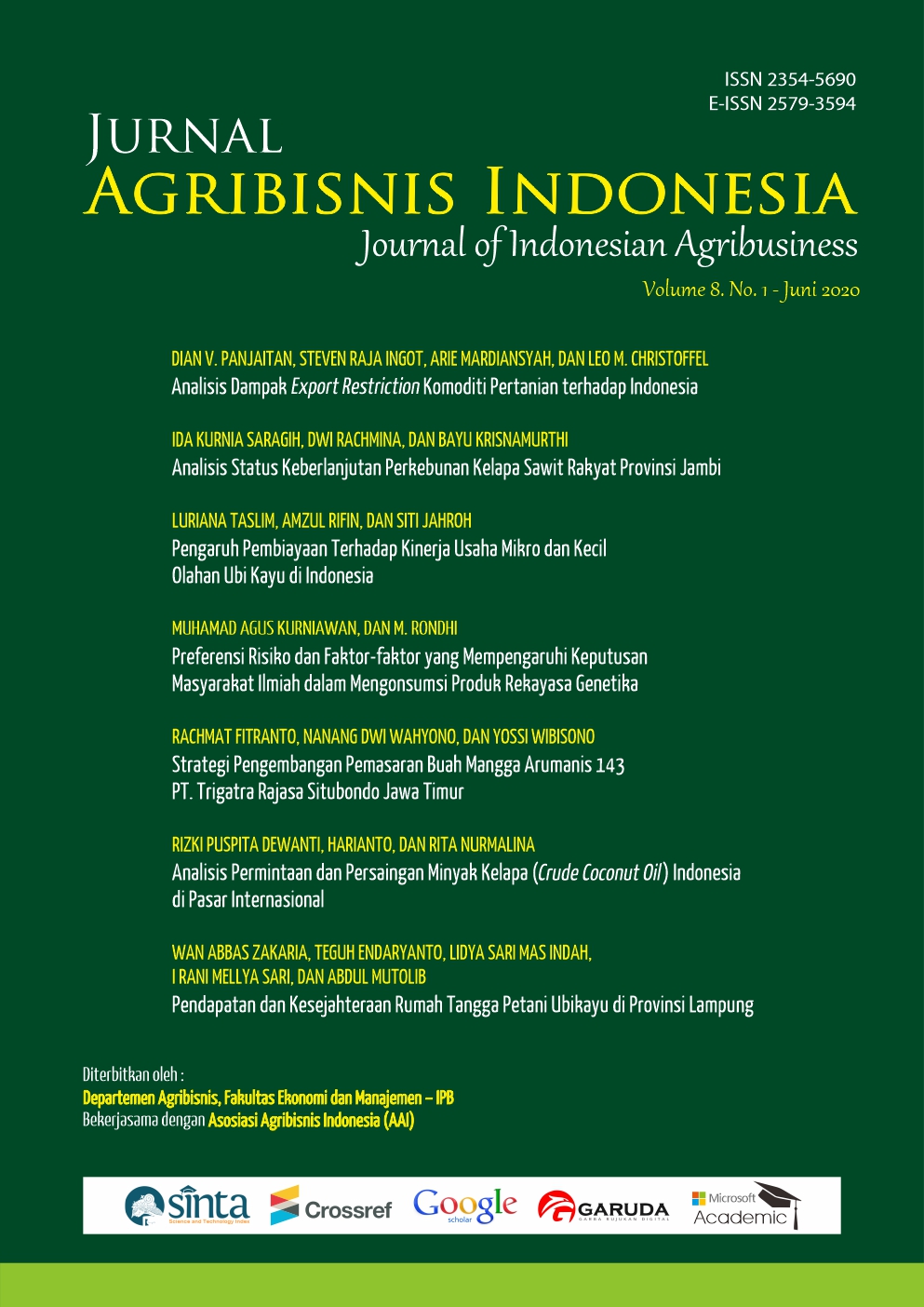Analisis Status Keberlanjutan Perkebunan Kelapa Sawit Rakyat Provinsi Jambi
Main Article Content
Abstract
Oil palm plantations are strategic commodities in the national economy and public welfare. Smallholder oil palm plantations as part of the palm oil commodity supply chain currently face business sustainability issues. This study aims to analyze the sustainability of community oil palm plantations based on index assessment using the Rap-Palmoil method through the Multidimensional Scaling (MDS) method. Multidimensional analysis of MDS in terms of economic, social, environmental, institutional, and technological dimensions as aspects examined in this study. This research was conducted in two regencies of oil palm plantations in a broad area of land in Jambi Province, namely Muaro Jambi Regency and Merangin Regency. The data used are primary and secondary data, primary data are obtained from interviews with farmers while secondary data are obtained from the Central Statistics Agency, Plantation Service, and literature that supports this research. Respondents in this study were 99 farmers selected purposively. The results of the multidimensional sustainability analysis of the Jambi Province oil palm plantation sustainability index were 57,79 included in the quite sustainable category. While the results of the sustainability index analysis for the five dimensions are 54,11 (economy), 66,83 (social), 58,64 (environmental), 46,40 (institutional), 59,02 (technology). All dimensions are overall included in the "moderately sustainable" category except the institutional dimension in the "less sustainable" category. The sustainability of oil palm plantations in each dimension has a different sustainability index so that different policies are needed to evaluate the sustainability of community oil palm plantations in Jambi Province.
Downloads
Article Details
Jurnal Agribisnis Indonesia (JAI) is an Open Access Journal. The authors who publish the manuscript in this journal agree to the following terms:
Creative Commons License
JAI is licensed under a Creative Commons Attribution 4.0 International License. This permits anyone to copy, redistribute, remix, transmit, and adapt the work provided the original work and source are appropriately cited.
This means:
(1) Under the CC-BY license, authors retain ownership of the copyright for their article, but authors grant others permission to use the content of publications in Jurnal Agribisnis Indonesia in whole or in part provided that the original work is properly cited. Users (redistributors) of JAI are required to cite the original source, including the author's name, JAI as the initial source of publication, year of publication, volume number, issue, and Digital Object Identifier (DOI); (2) Authors grant JAI the right of first publication. Although authors remain the copyright owner.
References
Andriani. Evi. 2017. Analisis Sumber Pendapatan Petani Kelapa Sawit. Jurnal-Agrisep 16(2): 2579-9959
[BPS]. Badan Pusat Statistik 2018 Statistik Perkebunan Kelapa Sawit. Jakarta. Badan Pusat Statistik
Baumgärtner, Martin Quaas. 2010. What is sustainability ecopapers 69(3) 224-450
[COSCA]. Committee on sustainability assessment. 2013. The cosa measuring sustainability report; coffee and cocoa in 12 countries. Committee on Sustainability Assessment. Philadelpia.
[Ditjenbun]. Direktorat Jendral Perkebunan. 2014. Statistik perkebunan kelapa sawit indonesia. Sekretariat Direktorat Jendral Perkebunan. http/ditjenbun.pertanian.go.id
Dalal-Calyton, B. S Bass. 2002. Sustainable Development Strategies, Aresoure Book. Organization For Economic Co-Operation And Development Programme. Earthsan Publications Ltd, London.
Daulay AR et al. 2016. Analisis Faktor Penyebab Alih Fungsi Lahan Sawah Menjadi Sawit Di Kabupaten Tanjung Jabung Timur. Analisis Kebijakan Pertanian 14(1):1-15
Deng H. 2015. Multicriteria Analysis for Benchmarking Sustainability Development Banchmarking. International Journal 22(5):791-807.
Fauzi, A dan S. Anna. 2005. Pemodelan Sumberdaya Perikanan Kelautan Untuk Analisis Kebijakan. Penerbit Gramedia Pustaka. Jakarta
Hidayatno. M, Supiandi S. S Yahya. L I Amien. 2009. Analisis Keberlanjutan Perkebunan Kakao Rakyat Di Kawasan Perbatasan Pulau Sebatik Kabupaten Nunukan Provinsi Kalimantan Timur. Jurnal Agro Ekonomi 27(2): 213-229
Kavanagh P Dan Pitcher TJ. 2004. Implementing Microsoft Excel Software For RAPFISH: A Technique For The Rapid Appraisal Of Fisheries Status. Fisheries Centre Research Reports.12(2): 3-75.
Kavanagh, P. 2001. Rapid Apraisal Off Fisheries (Rapfish) Projet. Rapfish Softwere De Eruption (For Mirosoft Excel). University Of British Columbia, Fisheries Enter, Vanonver.
Kementerian Pertanian. 2017. Outlook Kelapa Sawit. Jakarta
Munashinge, M. 1993. Envirinmental Economic And Sustainable Development. The International Bank For Reonstrution And Development/The World Bank. Washington, D.. 20433, U.S.A
Ngadi, Mita Noveria. 2015. Keberlanjutan Perkebunan Kelapa Sawit Di Indonesia Dan Prospek Pengembangan Di Kawasan Perbatasan. Masyarakat Indonesia 43(1)
Nurmalina, Rita. 2008. Analisis Indeks Dan Status Keberlanjutan Sistem Ketersediaan Beras di Beberapa Wilayah Indoneia. Jurnal Agro Ekonomi 26(1): 47-79
Nurmalina, Rita. 2008. Keberlanjutan Sistem Ketersediaan Beras Nasional: Pendekatan Teknik Ordinasi Rap-Rice Dengan Metoda Multidimensional Scaling (MDS). Jurnal Agribisnis dan Ekonomi Pertanian 2(2):1978-479
Ordóñez C, P N Duinker. 2010. Interpreting Sustainability for Urban Forests. Jurnal Canada 2:124-127., http://www.mdpi.com/2071- 1050/2/6/1510
Pitcher, T.J., And P. David. 2001. RAPFISH: A Rapid Appraisal Technique To Evaluate The Sustainability Status Of Fisheries Research 49:255
Supriadi, Wiwin. 2013. Perekebunan Kelapa Sawit Dan Kesejahteraan Masyarakat di Kabupaten Sambas. Jurnal Ekonomi Daerah 1(1):1978-7170
UN (United Nation), 2015, Transforming Our World: The 2030 Agenda for Sustainable Development. A/Res/70/1. United Nation. www.Sustainabledevelopment.un.or
Utami. Rany, Eka Intan KS, Meti Ekayani. 2017. Dampak Ekonomi Dan Lingkungan Ekspansi Perkebunan Kelapa Sawit (Studi Kasus: Desa Penyabungan, Kecamatan Merlung, Kabupaten Tanjung Jabung Barat, Jambi). Jurnal Ilmu Pertanian Indonesia (JIPI) 22(2): 2443-346

